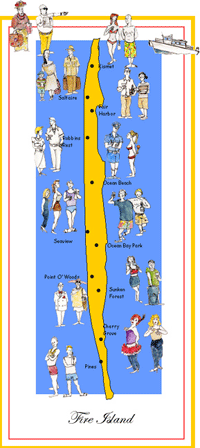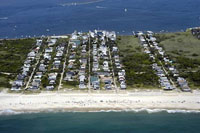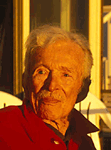Kismet and the World Loses a Courageous Newsman
By Jeanne Lieberman
"Fritz" Littlejohn was one of Kismet's first settlers, in the '40's. After his first wife died he married Ann, a photojournalist, and they bought a house in Kismet facing the National Seashore. This inspired Ann's multi award winning photos of Fire Island deer, birds and landscapes, and she is now an internationally known photographer traveling all over the world for her prize winning pictures.
I met Fritz in the 80's and was often entertained by his wit and the acuity of his observations. He always read my various writings and I never knew the value of his compliments until, reading his obits, I realized what a great journalist he was. Thank you, Fritz. Kismet, and our Country, will miss you.
Francis Littlejohn Dies; Aired Full McCarthy Hearings on ABC
New York Times
Friday, December 9, 2005
Francis Newton "Fritz" Littlejohn, 97, news director at ABC in 1954 when the network provided gavel-to-gavel coverage of the Army-McCarthy hearings, died of cardiac arrest Nov. 24 at his home in New York City .
NBC News writer, News Editor 1945-52
Managing Editor CBs-TV News (1952-54) ; AB C Director of ABC News And Special Events. 1954-60.
The hearings were convened to investigate charges brought against the Army by the junior Republican senator from Wisconsin, Joseph R. McCarthy.
The Army leveled charges of its own, maintaining that McCarthy's chief counsel, Roy M. Cohn, had pressured military officials to give privileges to a consultant on Cohn's staff, G. David Schine, who had been drafted into the Army during the Korean War.
All four networks were expected to carry the complete hearings live, but NBC and CBS decided at the last minute to stay with their profitable daytime soap operas. That left the DuMont network and ABC.
Although there were reservations within ABC, Mr. Littlejohn insisted on live coverage, gavel to gavel. He had the backing of ABC's president, Robert E. Kintner, and the network's vice president for news, John Charles Daly.
"He looked like a laid-back Southerner. He was anything but," Mort Lebow, a colleague, said of Mr. Littlejohn. "He had foresight. He knew the public was interested."
With an audience of about 20 million viewers at any one time, the landmark hearings lasted 36 days, for 188 hours of broadcast time. Their climax was an exchange between McCarthy and lawyer Joseph N. Welch, representing the Army.
After the senator insinuated that a young lawyer in Welch's firm harbored communist sympathies, Welch responded with a question that would become iconic: "Have you no sense of decency, sir, at long last? Have you left no sense of decency?"
The Senate censured McCarthy in 1954, and he died of complications from alcoholism three years later.
Mr. Littlejohn was born on a farm in Pacolet, S.C., that had been in his family for more than 200 years. He graduated from Davidson College in North Carolina in 1929 and played minor league baseball in Danville, Va., before becoming a sports reporter for the Charlotte Observer in 1931.
He stayed with the Observer until 1937, when he joined the Associated Press as a sports reporter; he later became a news editor. He served in the Army Air Forces during World War II and joined ABC in 1945 as director of news, special events and public affairs.
He left ABC in 1961, shortly after Daly departed over a dispute with the network involving control of news programs. Daly was replaced by James C. Hagerty, former press secretary to President Dwight D. Eisenhower.
In 1963, Mr. Littlejohn became a media consultant to the U.S. Public Health Service's fledgling water pollution control program, and in 1967 he was named deputy to the director of the Voice of America and head of the English-language division. He covered every political convention from 1948 to 1972 before retiring in 1973.
Afterward, he spent time at his second home, on Fire Island in New York, where he enjoyed fishing and gardening.
An article he wrote for Reporter magazine in the 1960s described the old neighborhood where he lived on Manhattan's East Side before it was supplanted by the construction of the U.N. headquarters:
"Beneath the windows, boys played stick-ball in the traffic. Across the way, ancient women lined their window sills with bed pillows to make their daylong leaning comfortable. Old boys in caps bowled in the abandoned slaughter pens the game of boccie, just as you have seen in the countryside in southern Italy or under the trees of the Champ de Mars. Family washing fluttered from retractable clothes lines on a display universal and colorful -- now supplanted by the Avenue of Flags on U.N. Plaza."
His 90th birthday present was a dictionary. By the time of his death, it was dog-eared; he read it every day.
Mr. Littlejohn's first wife, Edith Killian Littlejohn, died in 1958.
Survivors include his wife of 43 years, Ann Littlejohn of Manhattan.
IT'S A MATTER OF LIFE...
Newsman covered sports, politics
He decided to air Army-McCarthy hearings on television
GERRY HOSTETLER
If you thought the gavel-to-gavel coverage of the Watergate scandal was mind-blowing, you should have been around in the mid-1950s. You would have seen its grandaddy when the groundbreaking Army-McCarthy hearings were televised.
Francis Newton "Fritz" Littlejohn, whose controversial decision it was to air those hearings, died Nov. 24 in his New York home. He was 97.
He graduated from Davidson College in 1929 and played minor league baseball in Danville, Va., until 1931. He then got a job as a sports reporter for The Charlotte Observer that lasted until 1937.
He left the Observer and went to the Associated Press and as a sports reporter interviewed baseball icon Babe Ruth and tennis great Bill Tilden. He then became news editor until 1945. During that period duty called and he served in the Army Air Force 1942-43.
Fritz was news supervisor at NBC Radio until 1952 then advanced to managing editor of CBS-TV News. He covered the political scene from 1948 to 1972 and attended every nominating convention in that era. While he was at CBS, his wife Edith Killian died in 1959.
`A Southern gentleman'
He went to ABC and was made events director. That's where the widowed Fritz met Ann, a writer whose work he edited. They married in 1962, but Fritz had no children from either marriage."He was a Southern Gentleman," Ann said. "He was very charming and had a zest for life. He was well-respected at ABC for cutting through and getting to the heart of the matter. He had an excellent reputation."
While at ABC, Fritz's job empowered him to make the inventive decision to carry the hearings live. He opted to drop the popular daytime soap operas to bring this coverage to the masses.
Television was coming into its own then, and viewers were riveted to the little black and white screens. At issue was whether Sen. Joseph McCarthy's former chief counsel, Roy Cohn, had pressured the Army to give special privileges to inductee and former consultant on McCarthy's staff G. David Schine. Fritz retired from the Voice of America, where he had worked from 1967 to 1973 as deputy to director John Charles Daly.
"He had a brilliant career after he left the newspaper," said Burke Davis, author of some 47 books." Burke had known Fritz since 1937 and worked with him at the Observer. "He was extremely well-known in town," he said.
Son of police chief
And no wonder. If his own accomplishments were not enough, his dad was Frank Littlejohn, a Charlotte policeman who was chief of police from 1946 until 1958. On his office wall hung a letter naming him "the finest detective in the United States." The letter was signed by J. Edgar Hoover.
Fritz "outlived most and he had very few friends left," Ann said. "But he kept up with the children of all his friends." For his 90th birthday in 1998, many of those friends sent clips from his Observer career. "He will be remembered in Charlotte for his brilliant sports columns," his wife said.
Fritz was born in Pacolet, S.C., on the farm that's been in the family for more than 200 years. "It's still in the family," Ann said, "and has its own cemetery."
He's come full circle. That will be Fritz's final resting place.
Gerry
Hostetler
FRANCIS LITTLEJOHN DIES; AIRED FULL MCCARTHY HEARINGS ON ABC
By Joe Holley
Francis Newton "Fritz" Littlejohn, 97, news director at ABC in 1954 when the network provided gavel-to-gavel coverage of the Army-McCarthy hearings, died of cardiac arrest Nov. 24 at his home in New York City.
To view the entire article, go to http://www.washingtonpost.com/wp-dyn/content/article/2005/12/08/AR2005120802204.html?referrer=emailarticle
For Denise Riley, Star Democrat and Sunday Star
THE AGE OF ANXIETY, 1950 - 2005
Carlton E. Spitzer
Francis "Fritz" Littlejohn's death last month at 97, and publication of Haynes Johnson's 14 th book, The Age of Anxiety, vividly bring to mind the terrible days of McCarthyism, spawned by the junior senator from Wisconsin, Joe McCarthy, who conducted his bombastic, irresponsible campaign of fear following World War II.
His mantra alleged the government was riddled with communists and communist sympathizers. He was skilled at leveling accusations without verification, and making statements designed to engender fear and anxiety.
Littlejohn was the news director at ABC in 1954 who insisted on live coverage of the famous Army-McCarthy hearings while NBC and CBS stayed with their profitable daytime soap operas.
McCarthy alleged the Army coddled communists and communist sympathizers. He raved intemperately against hidden subversives on the Senate floor, where he was protected by immunity, and delivered alarming but unspecific speeches on public platforms, but never once produced evidence to support his claims.
The Army in turn attacked McCarthy for permitting his chief counsel, Roy Cohn, to pressure military officers to give privileged treatment to wealthy David Shine, Cohn's colleague who had been drafted into the Army.
The landmark hearing lasted 36 days and was seen by 20 million viewers, an enormous audience at that time. Littlejohn's decision was applauded. The hearings concluded on an emotional note when gentleman lawyer Joseph Welch of Massachusetts, serving as counsel for the Army - by then thoroughly disgusted with McCarthy's bullying tactics and insulting language - asked softly, "Have you no sense of decency, sir, at long last? Have you no sense of decency?"
McCarthy began his career on a lie, claiming falsely he was a military hero when he campaigned for the Senate; then exploiting fears of Russian infiltration of the U.S. government after WWII, making front page news across the country with his anti-communist crusade.
The crusade began with a speech at Wheeling, W. Va. where he held up a briefcase claiming it contained the names of 250 known communists in the State Department. He never named them. In the months that followed he cowed fellow Senators, silenced a furious Dwight Eisenhower then running for president, who was enraged but didn't want to, "get into the gutter with that fellow McCarthy."
McCarthy made the news media complicit in his deceit. As his campaign of fear gained momentum, reporters followed his every move, publishing his wild, unfounded and non-specific accusations. Everyone was under suspicion. Communists were trying to take over the government, he railed, and anyone who criticized his efforts was disloyal, surely a "pinko" and probably a communist.
Looking back, one is astounded by the power of his bravado and empty rhetoric.
Edward R. Murrow of CBS was not cowed, although some of his bosses were, and he had to work hard to persuade them to air his critical commentary on the junior senator from Wisconsin. In a memorable broadcast, currently dramatized in a movie, he said the nation could not defend freedom abroad by deserting it at home and charged McCarthy with exploiting fear. The broadcast drew the most phone calls and telegrams in ABC's history.
As Haynes Johnson points out in his powerful new book, McCarthy revealed his true character to millions of citizens across the country at the Army-McCarthy hearings: snarling, blustering, abusing, bullying, giggling, threatening, lying - from the third week in April through the second week of June, 1954. What citizens could not fully appreciate, Johnson writes, was McCarthy's deteriorating mental and physical condition, attributed chiefly to consuming a bottle of whiskey every day.
Johnson documents McCarthy's unethical and immoral behavior: doctoring photographs, presenting alleged evidence he and his staff actually contrived; appealing openly to federal workers to break the law by giving him classified material, believing he was somehow privileged to sweep aside constitutional questions to "save the land" from communists.
That he was a fraud and a liar were eventually revealed: his financial transgressions, the gross exaggeration of his military record, his abusive behavior toward colleagues and witnesses, the misuse of investigatory processes and subpoenas; perjury and fraud in falsifying documents, and mishandling classified material. Unmentioned but deeply felt was the climate of fear and anxiety he created nationwide.
When he was censored by his colleagues, Senator John Stennis of Mississippi accused him of pouring, "slush and slime" on the Senate. The censure was a severe blow to McCarthy. Reporters who previously found him "good copy" ignored him completely. Colleagues shunned him. He withdrew from social contact, often remaining away from the Senate for days, watching soap operas and drinking more heavily than ever. He was dead within two years.
Most troubling about McCarthyism, Johnson writes, is what it says about our institutions, especially the political system and the press, that are supposed to protect the public from demagogic abuses - and what it says, too, about how sorely the public requires such protection.
In McCarthy's time, what one read and with whom one associated was enough to be suspected of being a communist or communist sympathizer. Today, being a Muslim is sufficient reason to be suspected of being a terrorist or terrorist sympathizer.
We recoil in horror at foreign atrocities and torture, yet we have tortured with impunity anyone caught up in the chaos of war in Iraq and Afghanistan . Brutal interrogation has come before charges, if indeed, charges are ever presented.
We have reacted in fear, often behaving boorishly and relinquishing our own freedoms in the process. Johnson's book details abuse of "political" prisoners - not in Iraq , Afghanistan and Cuba - but in New York and New Jersey .
For those of us who lived through the McCarthy era, the book brings those days alive while detailing behind the scenes deals and discussions never before revealed. The book provides profoundly important history lessons for today.
Johnson draws sharp parallels between the climate of fear and anxiety generated by McCarthyism, and the fear and anxiety generated since 9/11 from deception, exaggeration, and misinformation.
Johnson is no stranger to the Mid-Shore, having addressed audiences at the Avalon Theatre on national health care, the life of Franklin D. Roosevelt, and The Age of Anxiety, the latter in 2003 when he was working on the book. It's available at the News Center .
His essential message is this: Understand the past to comprehend the present; face reality but do not let your judgment be ruled by fear.
***











